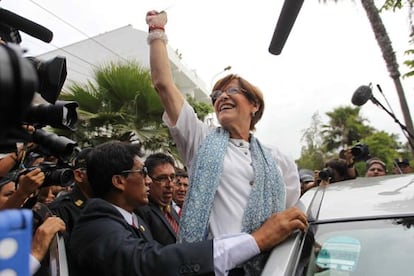Lima’s first woman mayor survives recall vote
Polls suggest Susana Villarán will stay in office after challenge from predecessor she accuses of corruption

Lima Mayor Susana Villarán will continue in her post after all exit polls show that she won Sunday’s unusual recall vote, which had been organized by her predecessor through a signature drive which caused bitter division in the city.
Official figures won’t be released until Tuesday, but Peru’s biggest pollsters, Ipsos Apoyo and Datum Internacional, both show that Villarán garnered 51 percent of the votes.
“The ‘no’ vote that millions of Lima residents cast signifies that the people now want peace,” said Villarán, who had come under attack over the past two years . “Today, Lima was victorious; no one lost. I will rest when my four-year term is over.”
Villarán ran for mayor in 2010 under the umbrella group Fuerza Social, a loose coalition of leftist organizations. But her campaign was plagued by fierce opposition from the majority of the media organizations that backed her conservative rival, Lourdes Flores Nano. Villarán was to win the election by just 35,000 votes, or 0.91 percent.
Villarán became the first woman to rule Lima City Hall in January 2011, but in October of that same year her predecessor as mayor, Luis Castañeda, submitted 1.2 million signatures demanding an electoral rerun based on legislation introduced in the 1990s to remove corrupt mayors.
In two years, she canceled consultancy contracts and reorganized routes of private minibuses, accusing Castañeda of allowing rampant corruption during his eight years in office. Even though the revocation vote was Castañeda’s brainchild, the former mayor hardly made any appearances during the months-long campaign.
For her part, Flores Nano, of the Christian Popular Party (PPC), came out in favor of Villarán and praised Sunday’s vote. “This is the first time I have celebrated a victory,” said the former lawmaker, who ran unsuccessfully for president in 2001 and 2006. Three former PPC mayors had also come out in favor of Villarán, despite having criticized her administration in 2011.
Another factor that helped the incumbent was the hiring of French-Argentinean publicist Luis Favre, who goes by the name of Belisario Wermus. Favre was instrumental in helping President Ollanta Humala win the 2011 election after he was sent to Peru by the Brazilian Workers Party (PT) with other campaign experts.
Tu suscripción se está usando en otro dispositivo
¿Quieres añadir otro usuario a tu suscripción?
Si continúas leyendo en este dispositivo, no se podrá leer en el otro.
FlechaTu suscripción se está usando en otro dispositivo y solo puedes acceder a EL PAÍS desde un dispositivo a la vez.
Si quieres compartir tu cuenta, cambia tu suscripción a la modalidad Premium, así podrás añadir otro usuario. Cada uno accederá con su propia cuenta de email, lo que os permitirá personalizar vuestra experiencia en EL PAÍS.
¿Tienes una suscripción de empresa? Accede aquí para contratar más cuentas.
En el caso de no saber quién está usando tu cuenta, te recomendamos cambiar tu contraseña aquí.
Si decides continuar compartiendo tu cuenta, este mensaje se mostrará en tu dispositivo y en el de la otra persona que está usando tu cuenta de forma indefinida, afectando a tu experiencia de lectura. Puedes consultar aquí los términos y condiciones de la suscripción digital.








































